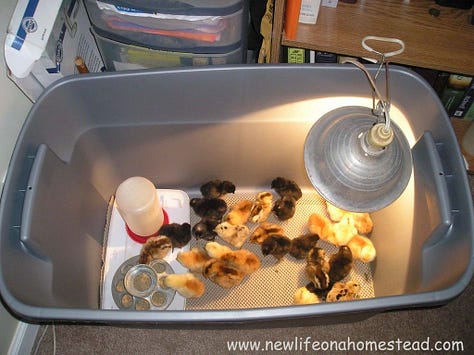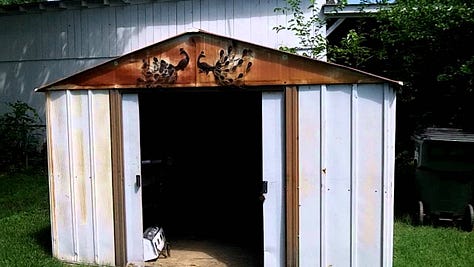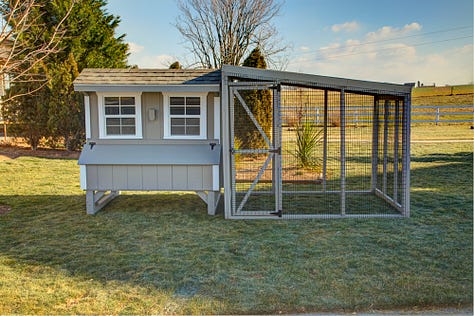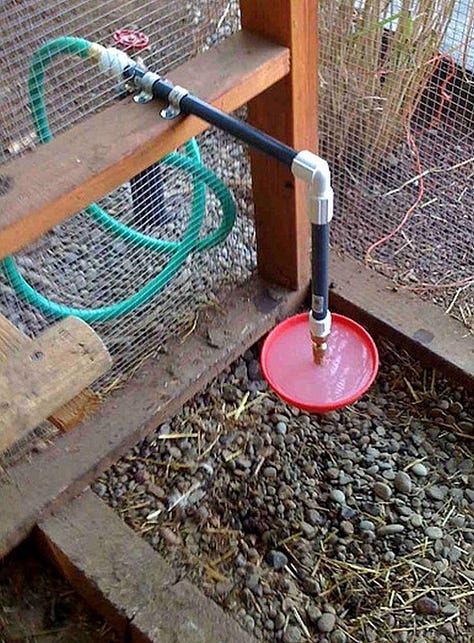A Primer On Chickens: Part- 2
Everything you need to know to get started raising chicks!
So you’ve made up your mind you are going to have chickens.
That’s wonderful news and welcome to the club! In this primer we are going to cover everything we know about raising chickens.
Getting Chicks
Buying From A Store VS Incubating Eggs VS Buying From Hatchery’s
Regardless where you get your chicks from, a healthy flock starts with healthy chicks. We have tried all three methods and have good experiences with each. Chicks have to come from someplace and there are two basic options. Either hatch your own by either using an incubator or broody hen you already have, or get some from a hatchery either via a store or shipped directly to you . Each option can produce great results, but might not be a good fit for you.
Let’s dig in.
Buying From A Store
No doubt if you go to a Rural King or Tractor Supply store you have heard the chirps from batches of chicks at certain times of year. Around us both of these stores offer some variety of chicks year round. Both companies have a business relationship with Hoover Hatchery.
We have had great success just buying chicks from these stores and here are some of the pros and cons of why you should consider start you flock by buying chicks from a retail store.
Pros:
No investment in buying incubator.
The chicks have already been through the shipping process and you won’t have loss from a mishap with the USPS.
You can decide at any time to start or grow your flock. No need to plan a 21 day incubation cycle.
Buying from a store lowers the minimum order threshold that hatcheries put on you. Therefore you can either mix and match your bird breeds or just take home less than you would have to if you ordered from a hatchery.
The prices of chicks are competitive and you don’t have to pay for shipping.
BONUS- If they have chicks that they are struggling to sell and have been there longer than usual, you can generally make them an offer to buy the whole flock. If they are getting their regular feathers and look healthy, ask to speak to the manager and offer them $1.00 per bird. Remember they have to pay to feed this type of inventory so it is beneficial to them to get rid of assets that cost them money.
Cons:
Sexing chickens can be an issue. As much as I love Brody our Rural King chicken associate, he is not a professional chicken sexer. Therefore instead of getting a bunch of laying hens you might end up with a flock or roosters.
Limited on the quantity and breeds that they have available at the time.
There is some biosecurity hazards with buying these chicks. Remember every snot nosed kid that has came by and touched or handled these birds could impact its overall heartiness.
If you choose to show chickens many of the breeds sold at box stores are cross breeds and therefore are not an American Poultry Association standard bird. You will either not be able to show the birds at shows, or if you do they will only get to be in a small class called Barnyard that will not win the overall show.
Buying Direct From A Hatchery
Where we live in the midwest we are flush with hatchery options that we can order our chicks online and they will arrive within the 2 day window the birds can survive in the mail. Do you research that the hatchery has a good reputation and that they a policy on replacing chicks who don’t survive the shipping process or die within the first 48 hours of unboxing. There are lots of great hatcheries, but we have had a great experience with Meyers Hatchery located in Polk Ohio.
Here are some pros and cons of why you should consider buying directly from a hatchery.
Pros:
Hatcheries have trained professionals that sex the birds to ensure that you get what you order. This is a very valuable distinct difference between buying at a store and buying from a hatchery.
Quantity and Pricing- With a hatchery you can choose as many birds as you need and you generally get better pricing when you buy bulk.
Generally hatcheries offer free shipping.
Cons:
There are usually minimum orders that you need to abide by.
Dealing with the birds and the USPS can be tricky. Sometimes loss of birds can occur if you live too far away from your hatchery or if any mishandling of the package occurs.
Hatching Eggs On Your Own
One final option is to hatch eggs on your own. Notice I didn’t necessarily say hatch your own eggs. There is a difference.
If you have your own flock already with a rooster and hens, you can gather your own eggs as fresh as possible and start the incubation process. Roosters can keep 8-10 hens fertilized at all times.
Another option is to buy eggs from someone in your community that has a rooster with their hens. Just contact them and ask to buy eggs that were gathered the same day. This works great when you want to build your flock, or grow select breeds from scratch as a project. As a fun bonus, kids love to learn about the hatching process. Below are some videos of our kids talking about the process and another video on watching a chicken hatch!
Brooder Basics
Young chicks need to be kept warm, dry, and well fed and watered. A good brooder will provide total enclosure for protection and have good dry bedding usually of fine wood chips or straw.



Coops 101
When the chicks are ready to leave the brooder, it is time to introduce them to their new home…the coop.
Coops come in all different shapes and sizes based on the needs of the reason you are raising chicks. But the number one purpose of having chickens in a coop is protection from predators. Chickens do well in runs and they can also do well free ranging if you have the space for it. Once chickens know where they are supposed to roost at night you can let them out and let them scratch and forage on their own. In our experience the birds naturally stay away from roads and usually stay within about 300 feet from their coops. The beautiful thing is that as soon as the sun starts to go down chickens will return to their roost on their own.






Egg layer chickens need a place to roost at night that is ideally off the ground and they need access to their nesting boxes. Most coops also have some sort of a fenced in run connected to them. We utilize an old dog kennel as our run and added chicken wire on top to protect the birds from aerial predators.
Meat birds are generally raised a little differently. They have an 8-10 week life and are generally raised in portable chicken structures called chicken tractors. Chicken tractors are portable shelters that give the meat birds access to scratch in fresh grass and forage for bugs by moving the tractor on a daily basis.



Also don’t forget our video on Building Your Own Eggmobile.
Feed, Feeders, and Waterers
Depending on the size of your operation you can either buy bag feed from either a farm store or local feed mill, or you can order bulk feed from a feed mill and have it delivered. Most people are not setup to handle feed by the ton, but if you eventually get there you can save…a ton! We still currently buy feed by the bag from our local mill, but when we get moved to the farm we are going to fill our first gravity wagon full of feed for the layer chicks.
Below is a very generic chart of what type of feed you should feed your birds. The main emphasis here is the % or protein you are supposed to be giving them. Layers require less as they are not meant to grow lots of meat on their bones, but meat birds are designed to pack on meat from a higher protein feed.
Feeders and waterers range from the most basic DIY setups to elaborate off the shelf products. You just have to find something that works for you. We use 25lb hanging feeders for our coops and bell waterers connected to 5 gallon buckets.









Final Thoughts
Having chickens is fun and easy, but not without problems. Chickens scratch to forage for bugs and therefore their runs become bare mud within a short period of time. Another thing to consider is keeping their coop relatively clean and what you are going to do with the manure you empty out every few months. One final thing to be on guard about is predators. You need to set yourself up for success so that your birds are safe. Finding out that you have lost a bird or your entire flock to a neighbors dog, racoon, or possum is no fun.
We highly recommend if you are interested in homesteading or getting into animals to start with chickens. Chickens are a great gateway animal into the farm lifestyle!


